News Around NIDDK
NIDDK-funded program promotes diversity in academic pediatrics
Program is one of several funded by NIDDK to diversify scientific workforce through professional society partnerships
By Lisa Yuan
To increase diversity in the pediatric workforce, the Academic Pediatric Association created the Research in Academic Pediatrics Initiative on Diversity, or RAPID, in 2012. Funded by NIDDK, the program supports early career scholars from underrepresented minority (URM) groups, as well as people with disabilities or from disadvantaged backgrounds, who are pursuing research careers in pediatrics and have specific interests in NIDDK mission areas.

“Underrepresented minorities account for 41% of children in the United States, but only 11% of pediatricians and 9% of medical school faculty. We hope that RAPID helps bridge this gap,” said RAPID Director Dr. Glenn Flores, director of the Health Services Research Institute at Connecticut Children’s Medical Center.
Flores recently published a study in Academic Medicine, the journal of the Association of American Medical Colleges, which analyzed the program’s first five years. The study found that RAPID is successfully fulfilling its goals to promote career advancement of URM pediatric researchers. Program participants, for example, gained valuable mentoring from senior investigators, opportunities to network, and experience in developing research and leadership skills. In addition, the study found a significant association between RAPID and professional society diversity: Among members of the Academic Pediatric Association, diversity increased by 43% since RAPID’s inception.
According to Flores, RAPID could become a national model for “enhancing URM career development and increasing professional society diversity.”
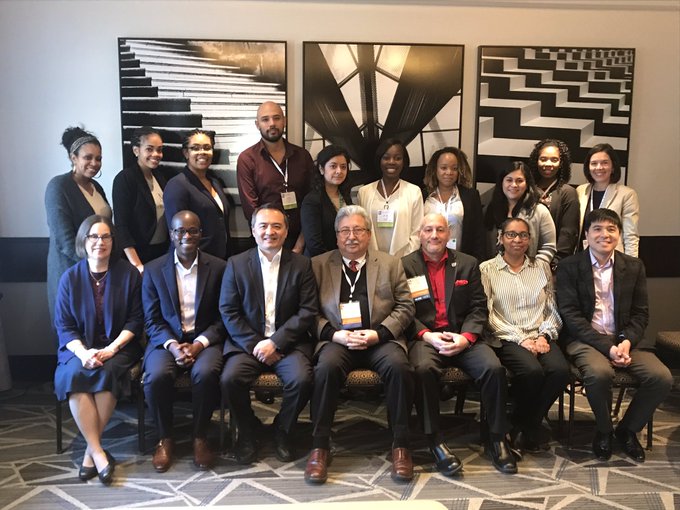
The program’s success is perhaps best exemplified in the achievements of its participants, such as Dr. Jennifer Woo Baidal, a former RAPID Scholar who is now the director of Pediatric Weight Management and assistant professor of pediatrics at Columbia University.
“The RAPID program provided me with critical senior- and peer-mentoring support among a diverse group of researchers to help me advance research on child health equity. The networking, advice, and encouragement I gained helped enable me to continue to pursue an academic research career in pediatrics,” said Baidal, who recently secured NIDDK funding for her research on pediatric fatty liver disease.
RAPID is one of several programs funded by the NIDDK Partnership with Professional Societies to Enhance Scientific Workforce Diversity grant (R25), managed by Dr. Katrina Serrano in NIDDK’s Office of Minority Health and Research Coordination. Similar programs supported by this type of grant include the Endocrine Society’s Future Leaders in Endocrinology (FLARE), the American Gastroenterological Association’s FORWARD, and the American Psychological Association’s Leadership and Education Advancement Program (LEAP) for Diverse Scholars.
“Professional societies provide an environment for education, information-sharing, networking, and mentoring, making them well-poised to support researchers from underrepresented backgrounds interested in careers pertinent to the society’s and NIDDK’s mission,” said Serrano. “I’m proud to oversee programs like RAPID, as they are critical to promoting, supporting, and sustaining a diverse scientific workforce.”
Getting to Know: Dr. Stephanie Chung
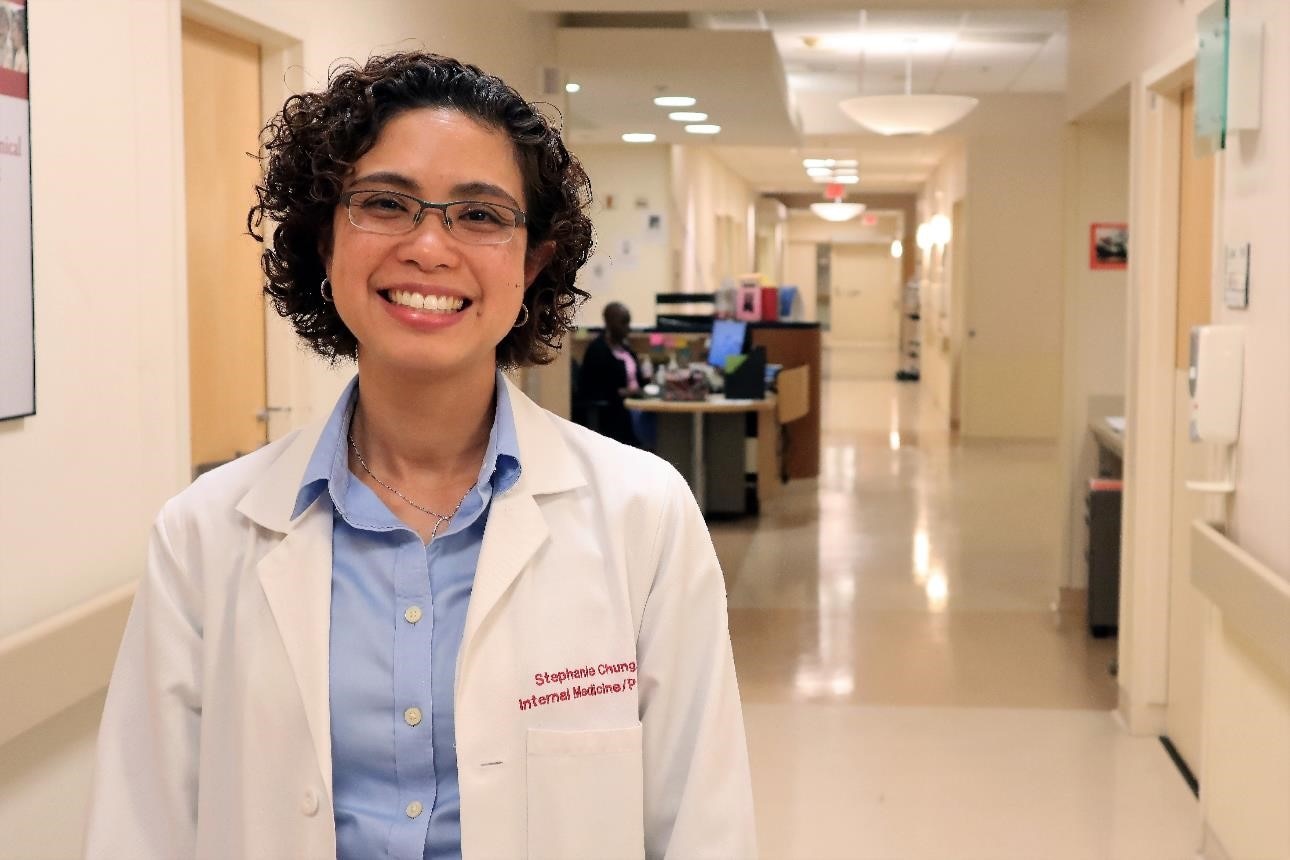
Credit: Jennifer Rymaruk, NIDDK
Dr. Stephanie Chung wears many hats: She is acting chief of the NIDDK Intramural Research Section on Pediatric Diabetes, Obesity and Metabolism; co-director of the NIH Clinical Center’s Metabolic Clinical Research Unit; NIH Lasker Scholar tenure-track investigator; and NIH Distinguished Scholar. She also leads an NIDDK/Children’s National Hospital research program focused on type 2 diabetes in children and young adults and just won an NIDDK mentoring award. Chung spoke with Lisa Yuan about her career, motivation, and challenges.
What do you hope to achieve through your research?
My section aims to understand how the interaction of genes, social environment, and lifestyles contribute to development of health disparities in pediatric diabetes, obesity, and heart disease. We know that type 2 diabetes is a major cause of death and disability worldwide, and this is magnified in underrepresented minority groups.
My research group seeks to minimize these health disparities, and the burden of diabetes in youth and young adults, by focusing on how to improve current treatment regimens. We also examine how to increase prevention and reduce the risk of developing diabetes, heart disease and disease-related complications.
Metformin is currently the first line of medication for diabetes in both youth and adults, but up to 50% of kids require additional therapy within two years of diagnosis. We hope our work, such as the MIGHTY (Metformin Influences Gut and Hormones in Type 2 Diabetes Youth) studies, helps lead to new targets and therapies to improve outcomes in kids and young adults 10 to 25 years old.

What motivated you to work with young people with diabetes, and what keeps you motivated?
In medical school, when I interacted with pediatric patients, I was struck by their struggles and how few treatment options they had.
That’s when I really became interested in pediatric diabetes and how these kids were going to manage this chronic disease burden as they grew up.
What keeps me motivated are the kids and their desire to live a regular life. I try to help them in any way, so that they can do things like start college, or their first job, without having to be saddled with multiple medications or with the unfortunate social stigma of type 2 diabetes and obesity. In the clinic, I see a lot of patients saying things like “Everybody in my family has it, so I should ignore it,” or “This is my fault, and I’m terrible because I’m overweight or obese.” I try to help direct their focus on being healthy and not on appearances or the shame they often feel.
You work with patients from diverse backgrounds, including many with a historical distrust of medical research. How do you gain and keep the trust of your patients and their families?
I connect with the families by being direct and transparent. My goal is to be an equal partner in their care – we are doing this together. My team and I promote a family centered approach, and all the while, we try to teach our patients to empower themselves to manage their diabetes.
Partnership and care - this is how I approach my clinical programs and research. My patients know that my research is born from the questions that they give me. For instance, when metformin wasn't working for them, they said to me, “Doc, why can't we do something else?” And I thought, good question, why can't we? So we initiated the MIGHTY protocol to better understand the action of metformin in youth and how we might combine it with other drugs or supplements to improve outcomes.
What advice would you give other women of color who are pursuing careers in science or medicine?
It’s the same advice I give any of my trainees: Don't just be good. Be excellent. Be stubborn. Be unrelenting in the pursuit of medicine and science. Keep at it. Listen. And when you listen, build up the courage to then start talking. Because you do have value. Every single one of my trainees, their opinions count, and they are going to be put down at some point. But it is not being put down that is the problem … it’s if you stay down. You must have the resilience to push forward to do what you believe in.
NIDDK continues to support COVID-19 efforts
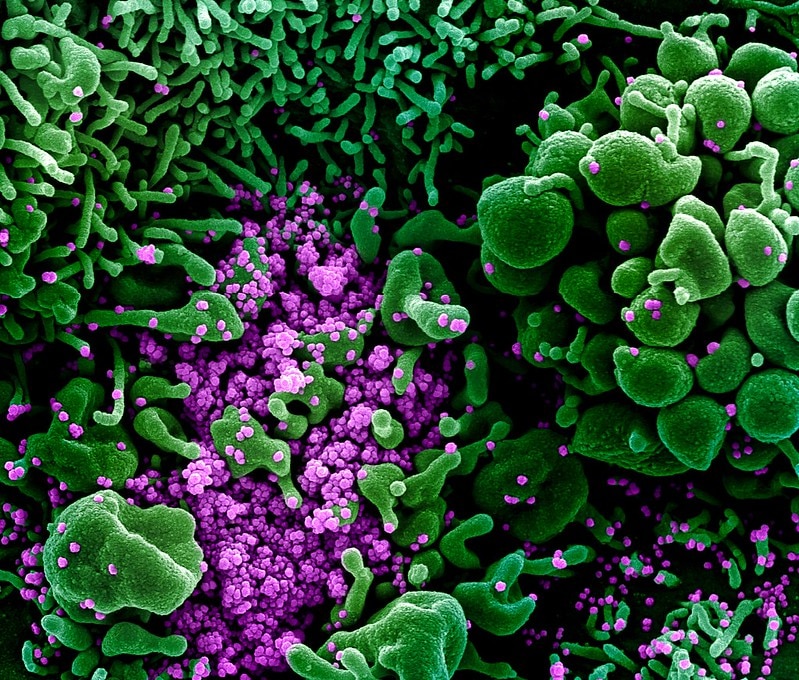
NIDDK continues to expand efforts to deepen our understanding of COVID-19 by conducting and supporting research, providing clinical care, and promptly sharing valuable, credible information and resources.
Many NIDDK intramural investigators are researching COVID-19 and how it affects people with diseases in our mission. Some of their recently published studies include:
- Diabetes, obesity, and risk prediction of severe COVID-19
- Physics of virus transmission by speaking droplets
- Activation of the SARS-CoV-2 receptor Ace2 through JAK/STAT-dependent enhancers during pregnancy
- SARS-CoV-2 receptor networks in diabetic and COVID-19–associated kidney disease
NIDDK Director, Dr. Griffin P. Rodgers, and NHLBI Director, Dr. Gary H. Gibbons, participated in a video interview with Dr. Howard C. Bauchner, editor-in-chief of the Journal of the American Medical Association (JAMA), to discuss their editorial, Obesity and Hypertension in the Time of COVID-19.
In addition to research done in NIDDK facilities, NIDDK also supported extramural COVID-19-related research, including:
- Germ-free mice under two-layer textiles are fully protected from bacteria in sprayed microdroplets: A functional in vivo test method of facemask/filtration materials
- An inflammatory cytokine signature predicts COVID-19 severity and survival
- Iron chelation may harm patients with COVID-19
- Pediatric Severe Acute Respiratory Syndrome Coronavirus 2 (SARS-CoV-2): Clinical presentation, infectivity, and immune Responses
- Mapping systemic inflammation and antibody responses in multisystem inflammatory syndrome in children (MIS-C)
- Rapid establishment of a COVID-19 perinatal biorepository: early lessons from the first 100 women enrolled
- The ACE2-deficient mouse: A model for a cytokine storm-driven inflammation
NIDDK also continues to participate in NIH’s Rapid Acceleration of Diagnostics-Underserved Populations (RADx-UP) initiative to expedite research addressing the disproportionate burden of COVID-19 on underserved and/or vulnerable populations.
For additional summaries of NIDDK’s COVID-19-related work, see NIDDK Director’s Update articles published earlier this year:
- NIDDK tackles COVID-19 through research, funding, and clinical care
- NIDDK brings scientific expertise to the fight against COVID-19
For more information on NIDDK’s response to COVID-19 and links to grant information and publications, visit the NIDDK COVID-19 Research Response page. To subscribe to NIH’s updates on COVID-19, visit www.nih.gov/health-information/coronavirus.
For more information on COVID-19, visit the Centers for Disease Control and Prevention (CDC) coronavirus webpage.
NIDDK clinical director retires from position after 31 years
After 31 years as clinical director in the NIDDK Division of Intramural Research, Dr. James (Jim) Balow, requested to step down from the role. As of Oct. 1, Dr. Christopher Koh, currently NIDDK’s deputy clinical director and associate research physician in NIDDK’s Liver Diseases Branch, began serving as acting NIDDK clinical director. Balow will remain in his position as acting chief and senior investigator in NIDDK’s Kidney Diseases Branch.

“With his knowledge on topics affecting NIDDK, NIH, and the broader medical community, Dr. Balow has earned enormous respect from his peers,” said NIDDK Director Dr. Griffin P. Rodgers. “His reputation for fairness and objectivity has made him a frequent go-to person for those seeking sage advice, and he has provided invaluable counsel to NIDDK’s Office of the Director over the decades. I am grateful we will continue to benefit from Dr. Balow’s wise counsel as he remains in his role in the Kidney Diseases Branch.”
After a fellowship in nephrology at Georgetown University Hospital, Balow began his NIH career with the National Institute of Allergy and Infectious Diseases in 1972 as a clinical associate with Drs. Anthony Fauci and Shelly Wolff and developed the first in-house nephrology patient consult service at the NIH Clinical Center.
After joining NIDDK in 1977, Balow developed a world-class clinical research program on immunologically mediated glomerular diseases. He quickly rose through the ranks at NIH, becoming chief of the Clinical Nephrology Service at the Clinical Center and chief of the Kidney Diseases Section in NIDDK’s Kidney Diseases Branch in 1984. He has since held many leadership positions at NIH and within the broader scientific community, including chair of the NIH Clinical Center Medical Executive Committee, Ethics Committee, and Credentials Committee, and the NIH Information Technology Management Committee.
An expert on immunologic glomerular diseases, Balow has published more than 250 scientific papers and book chapters. Along with his longstanding colleague Dr. Howard Austin, Balow led the establishment of the NIH standardized classification of the pathology of lupus nephritis and, with colleagues from the National Institute of Arthritis and Musculoskeletal and Skin Diseases, established the NIH regimen of pulse cyclophosphamide for treatment of lupus nephritis.
NIDDK will launch a national search for Balow’s replacement.
Painting the pandemic: NIDDK employee shares artistic talents
By Alyssa Voss
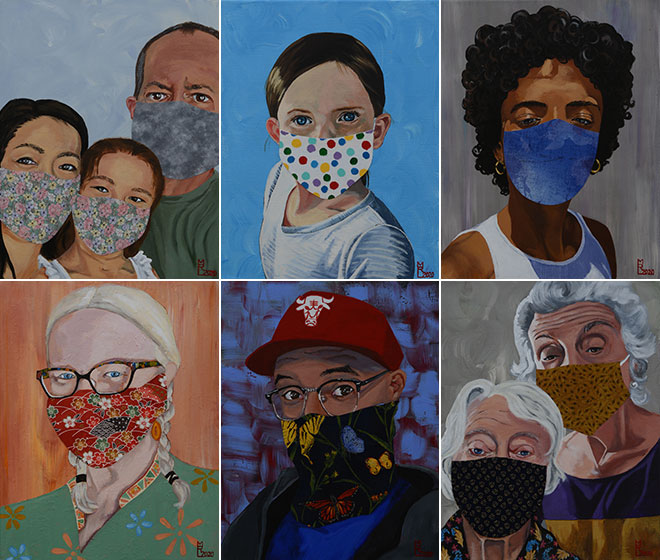
In the early days of the pandemic, NIDDK’s Dr. Maren Laughlin picked up her paintbrush to find comfort and connection. The program director for integrative metabolism research in the Division of Diabetes, Endocrinology, and Metabolic Diseases, had an idea – to portray people wearing their masks. A few months later, 25 colorful mixed media “COVID Portraits” in acrylic and fabric on canvas are the result, now on display in the NIH Clinical Center near the COVID-19 testing check-in station.
“When we first learned about the pandemic’s shutdowns and public health measures that were necessary to try to contain the virus, there was so much anxiety across the community, and a strong sense of isolation” said Laughlin. “These portraits celebrate people who choose to wear masks out of respect for each other’s health during this confusing and scary time and illustrate how unique and beautiful they are despite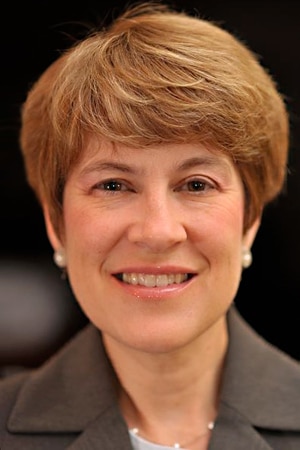 Dr. Maren Laughlin the mask. I hoped to provide a little connection during a time of physical distancing.”
Dr. Maren Laughlin the mask. I hoped to provide a little connection during a time of physical distancing.”
When Laughlin got the idea for the portraits, she put out a call to family and friends for masked selfies and promised to paint a portrait of everyone who sent her a photo. Overall, the project took four months to complete and includes people from across the U.S. and two from France. Along with the upcoming display at the Clinical Center, some of the paintings have been displayed at a local venue during mask-sale fundraisers.
“Everyone who sent their selfies will have a unique souvenir of 2020,” said Laughlin. “Hopefully the portrait will remind them how we came together in new ways, even while staying apart physically.”
NIDDK director updates Congress on research progress and opportunities
In October, NIDDK Director Dr. Griffin P. Rodgers participated in three virtual congressional briefings to describe the importance of research to improve the health of people affected by diseases and disorders within the NIDDK mission.
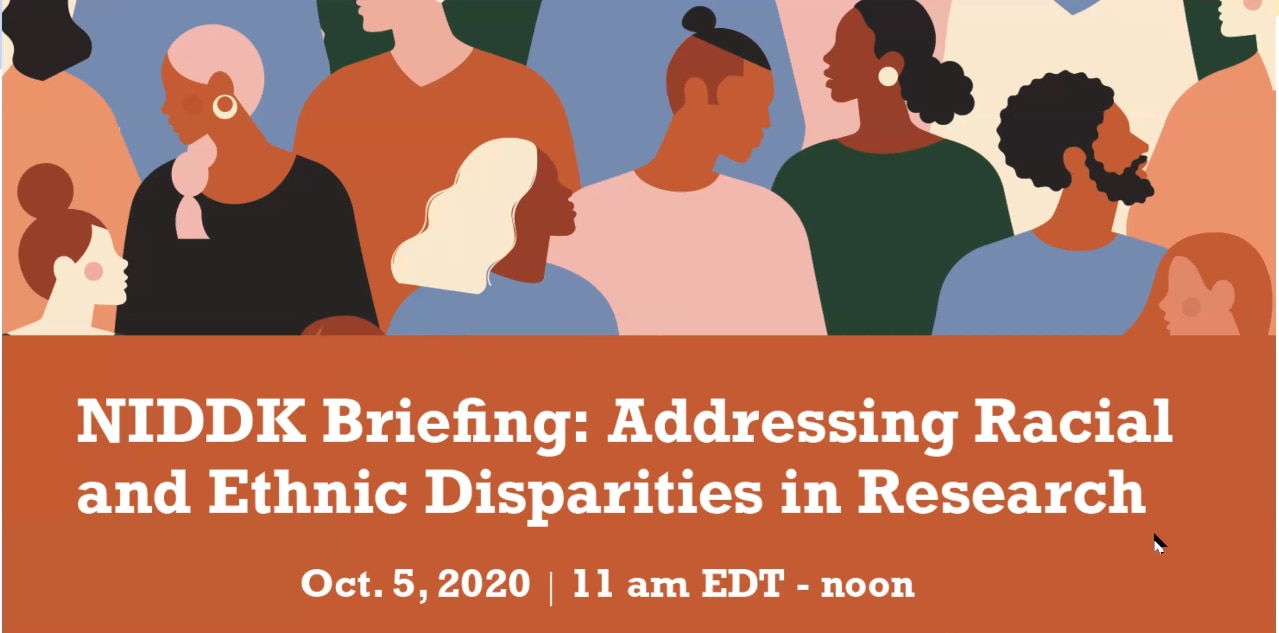
First, an October 5 briefing focused on health disparities. After Rep. Donald Payne (NJ) gave opening remarks, Rodgers discussed four cornerstones of NIDDK’s approach to promote health equity: recruit diverse, representative study cohorts; recruit and train underrepresented minority scientists; engage clinical trial participants more broadly in research; and identify biologic and systemic causes of disparities.
Second, at an October 26 briefing, Rodgers explained how some conditions within the NIDDK mission put people at high risk of severe illness from COVID-19, and how the pandemic has affected the biomedical research enterprise. For example, he discussed how obesity, type 2 diabetes, and chronic kidney diseases all place a disparate burden on minority populations, and that this burden is exacerbated by the pandemic, with increased rates of infection and disproportionately poor outcomes from COVID-19 seen in people with these same conditions.
Finally, an October 27 briefing focused on the Special Statutory Funding Program for Type 1 Diabetes Research. After opening remarks by Rep. Diana DeGette (CO) and Rep. Tom Reed (NY), co-chairs of the Congressional Diabetes Caucus, Rodgers described research accomplishments stemming from the Program, such as new artificial pancreas technologies, and future type 1 diabetes research opportunities.
The briefings provided important venues to share some of NIDDK’s research progress and emerging opportunities.
Editors’ note: Read more about the four cornerstones of NIDDK’s approach to promote health equity in the JCI Viewpoint article: NIDDK initiatives addressing health disparities in chronic diseases.
Working group forms to address gaps in women’s health
 by Matthew Oldham
by Matthew Oldham
As the medical community moves closer to personalized medicine, there is a clear need to learn more about the biological sex and gender differences in many diseases and conditions, particularly for women, who have often been understudied in clinical research. The NIDDK Women’s Health Working Group (WHWG) aims to close that gap.
Launched in October 2019, the group started by analyzing NIDDK’s research portfolio to assess current NIDDK women’s health efforts. “You don’t have a women’s health study simply because it includes women” said WHWG Chair Dr. Christine Maric-Bilkan. “First we needed to answer, ‘What does it mean to research women’s health?’ For example, a pregnancy study can be considered specific to women’s health. But pregnancy is not experienced by all women, it’s not the only thing women experience.”
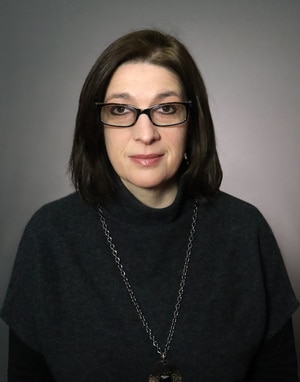 Dr. Christine Maric-Bilkan. Credit: NIDDKWorking toward the goal of inclusive research, the group, with its 18 members representing each of NIDDK’s divisions, advises NIDDK leadership on scientific direction, stewardship, and oversight of research – along with developing new programs and initiatives – related to the health of women across their lifespans, diseases and conditions unique to women, and sex and gender differences in diseases under NIDDK’s mission.
Dr. Christine Maric-Bilkan. Credit: NIDDKWorking toward the goal of inclusive research, the group, with its 18 members representing each of NIDDK’s divisions, advises NIDDK leadership on scientific direction, stewardship, and oversight of research – along with developing new programs and initiatives – related to the health of women across their lifespans, diseases and conditions unique to women, and sex and gender differences in diseases under NIDDK’s mission.
NIDDK is one of three NIH institutes that has a women’s health working group. The groups communicate and coordinate activities, along with NIH’s Office of Research on Women’s Health. “I’m looking forward to seeing the progress this group can make for women’s health research within NIDDK and across NIH through its collaborations,” said NIDDK Director Dr. Griffin P. Rodgers.
The COVID-19 pandemic has, as with many efforts, extended the group’s timeline for the portfolio analysis. They hope to finish that stage by spring of 2021.
“Ultimately, our goal is to get to a place where the group doesn’t need a reason to exist by closing gaps in women’s health research,” Maric-Bilkan said. “We want to put ourselves out of business.”
NIDDK hosts first virtual Employee Appreciation Awards Ceremony
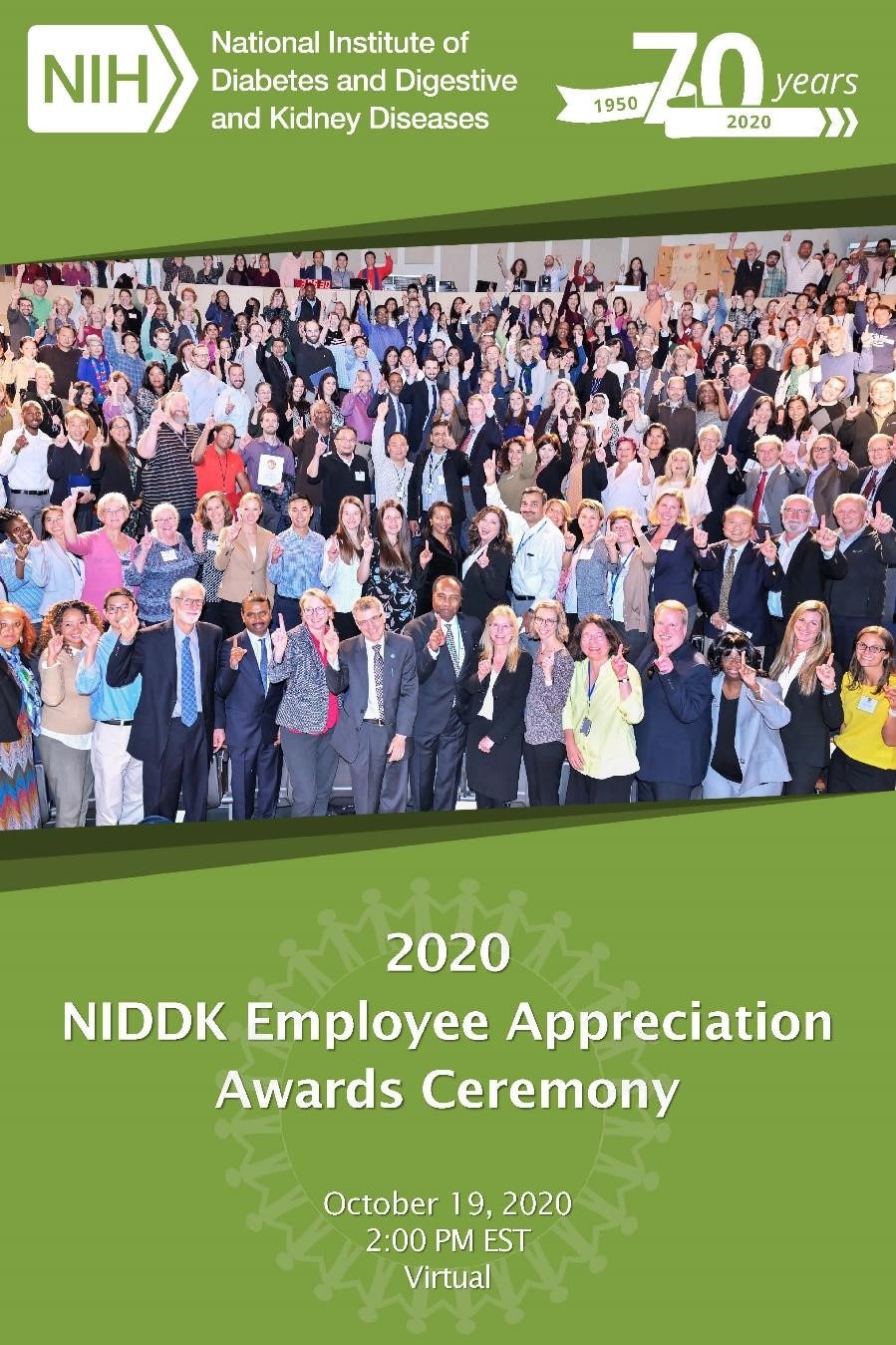 Credit: NIDDK Workforce, Development, and Planning BranchFor the first time, NIDDK held its annual Employee Appreciation Awards Ceremony in a virtual setting. The event, which took place in October, focused on celebrating NIDDK employees’ remarkable scientific, clinical, and administrative achievements in the last year, including successfully transitioning to work together from afar, while also acknowledging this year’s hurdles. See the full list of winners in the Commendations & Commencements section.
Credit: NIDDK Workforce, Development, and Planning BranchFor the first time, NIDDK held its annual Employee Appreciation Awards Ceremony in a virtual setting. The event, which took place in October, focused on celebrating NIDDK employees’ remarkable scientific, clinical, and administrative achievements in the last year, including successfully transitioning to work together from afar, while also acknowledging this year’s hurdles. See the full list of winners in the Commendations & Commencements section.
NIDDK director speaks at NIH Rural Health Day seminar
NIDDK director Dr. Griffin P. Rodgers gave closing remarks at the 2020 NIH Rural Health Day Seminar, which took place virtually on November 19. The seminar explored how COVID-19 has affected rural communities, whose residents make up about 20% of the country’s population, but often have less access to health care.
Following opening remarks by Dr. Eliseo J. Pérez-Stable, director of the National Institute on Minority Health and Health Disparities (NIMHD), researchers from the NIH and universities nationwide presented on topics including rural health outcomes, workplace issues, and community response during COVID-19.
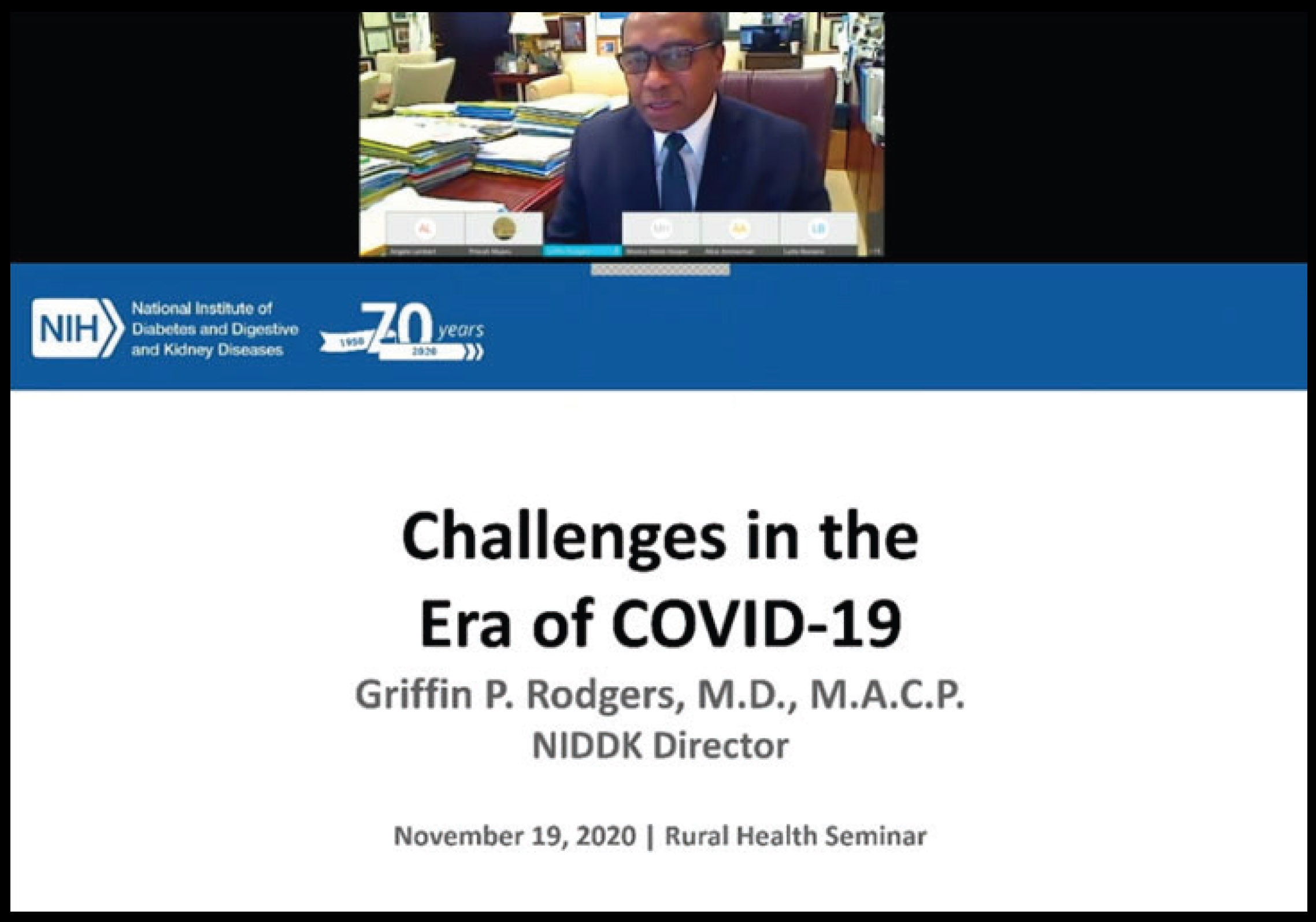
As Rodgers told the audience, the focus on rural communities “is critically important to ensure that all Americans benefit from the advances being achieved through research.”
Rodgers ended the day with a discussion about the disproportionate burden of disease on rural populations, who have a high prevalence of type 2 diabetes, obesity and other conditions in NIDDK’s mission, and how COVID-19 has deepened these health disparities. The NIMHD and National Center for Advancing Translational Sciences, both components of NIH, sponsored the seminar, and Dr. Rob Rivers of NIDDK’s Office of Minority Health Research Coordination served on the trans-NIH planning committee. The seminar is available to view online on NIH’s videocast page.

